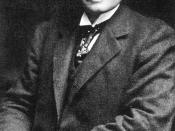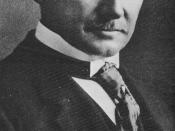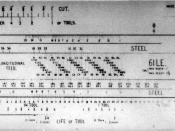Principles of Scientific Management
-Describe and break down the take to its smallest unit; science for each element of work
-Restrict behavioral alternatives facing worker-remove worker discretion in planning, organizing, controlling
-Use time and motion studies to find one best way to do work
-Provide incentives to perform job one best way-tie pay to performance
-Use experts (industrial engineers) to establish various conditions of work
(Wertheim)
Although the idea was generated long ago, the term Scientific Management did not come into being until the latter half of the 19th century, the time of the Industrial Revolution. Frederick Winslow Taylor, the man deemed as the creator of the "science of management" argued that low productivity, high turnover, etc., was the result of "defective organization". Taylor determined that "production was governed by universal and natural laws that were independent of human judgment." He offered that the purpose of Scientific Management was to determine which law worked best for the group.
(Reshef)
While he was not the sole originator of the beliefs he promoted, Taylor was the first to effectively present the ideas to industrial managers who were eager to find ways to enhance performance while cutting productivity costs. Taylor equated humans to that of machine parts in the sense that they were interchangeable and each responsible for a specific function. (Wertheim) His methods showed dramatic increases in production.
The philosophy of Scientific Management developed several principles. In his model, Taylor explained that a successful manager "controlled every aspect of the production process " in that "workers only execute what managers plan." (Reshef)
While researching this topic, many references were made to the Chinese, Egyptians, and Roman times. For example, The Great Pyramid contained over 2 million blocks of stone--each weighing over 2.5 tons. Without any assistance of our modern day...


